Hong Kong News

A year under the national security law: arrests, sanctions, and a swifter Legco
Some 365 days after the imposition of a sweeping national security law, Hong Kong has changed irrevocably. Advocates argue the law was badly needed to protect national sovereignty, after radical anti-China elements called for foreign intervention, and that it had brought an end to months of anti-government protests.
It restored order and brought business back to the city, supporters have said. But critics decry that the law has been weaponised and used to silence political dissent, crush all viable opposition, induce fear in the media and academia and test the courts.
The Post sums up how different sectors have been impacted by the law, which punishes subversion, secession, terrorism or colluding with foreign forces with the maximum penalty of life imprisonment, since it was passed on June 30 last year.
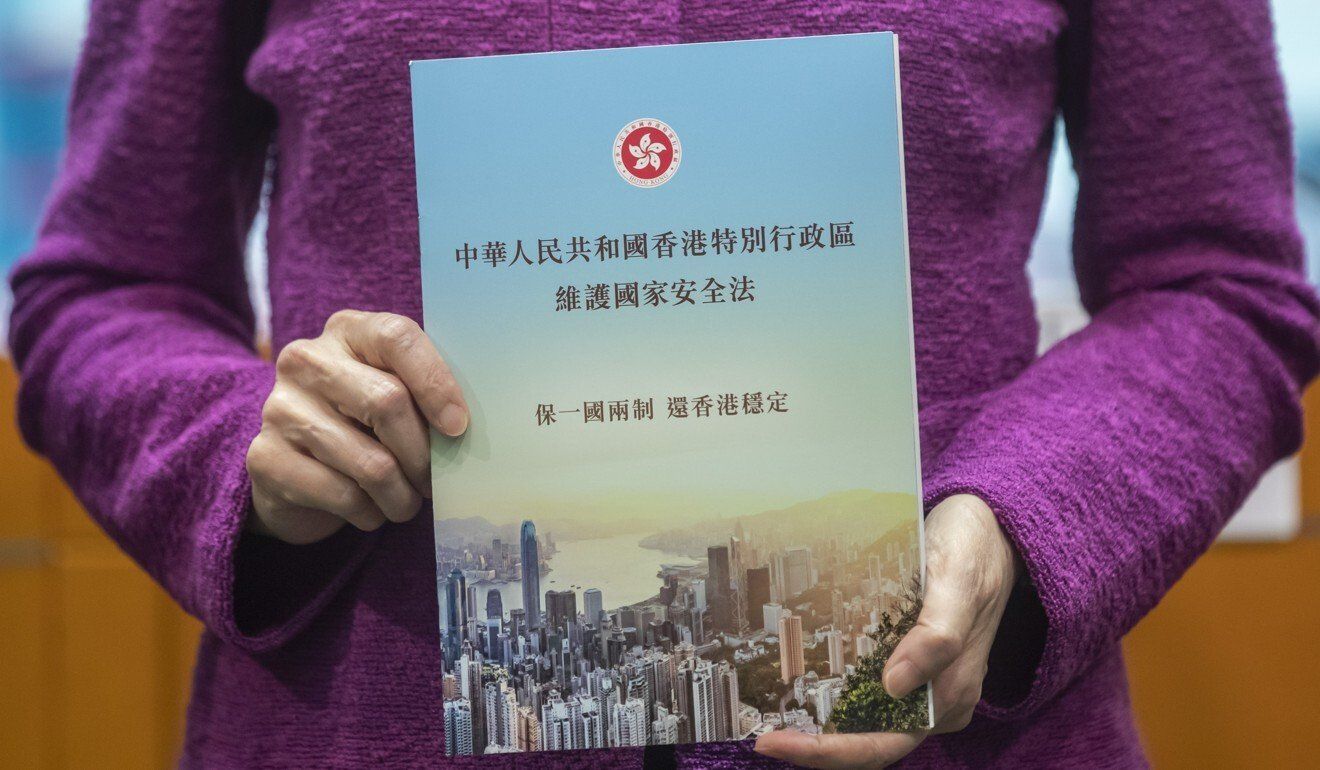 City leader Carrie Lam holds a copy of the new national security law at a press conference on July 1, 2020.
City leader Carrie Lam holds a copy of the new national security law at a press conference on July 1, 2020.
Media: Apple Daily closes after arrests, other media outlets pull commentaries
Apple Daily, a 26-year-old newspaper founded by Jimmy Lai Chee-ying, ceased operations in late June after national security police froze HK$18 million (US$2.3 million) worth of its assets and arrested five of its senior executives and an editorial writer on suspicion of collusion with foreign forces.
Two of them were charged for their alleged roles in the publication of more than 30 articles said to be part of a conspiracy to attract foreign sanctions. Another writer was intercepted while trying to leave the city later.
Last August, Lai was arrested – and subsequently remanded – for the same offence.
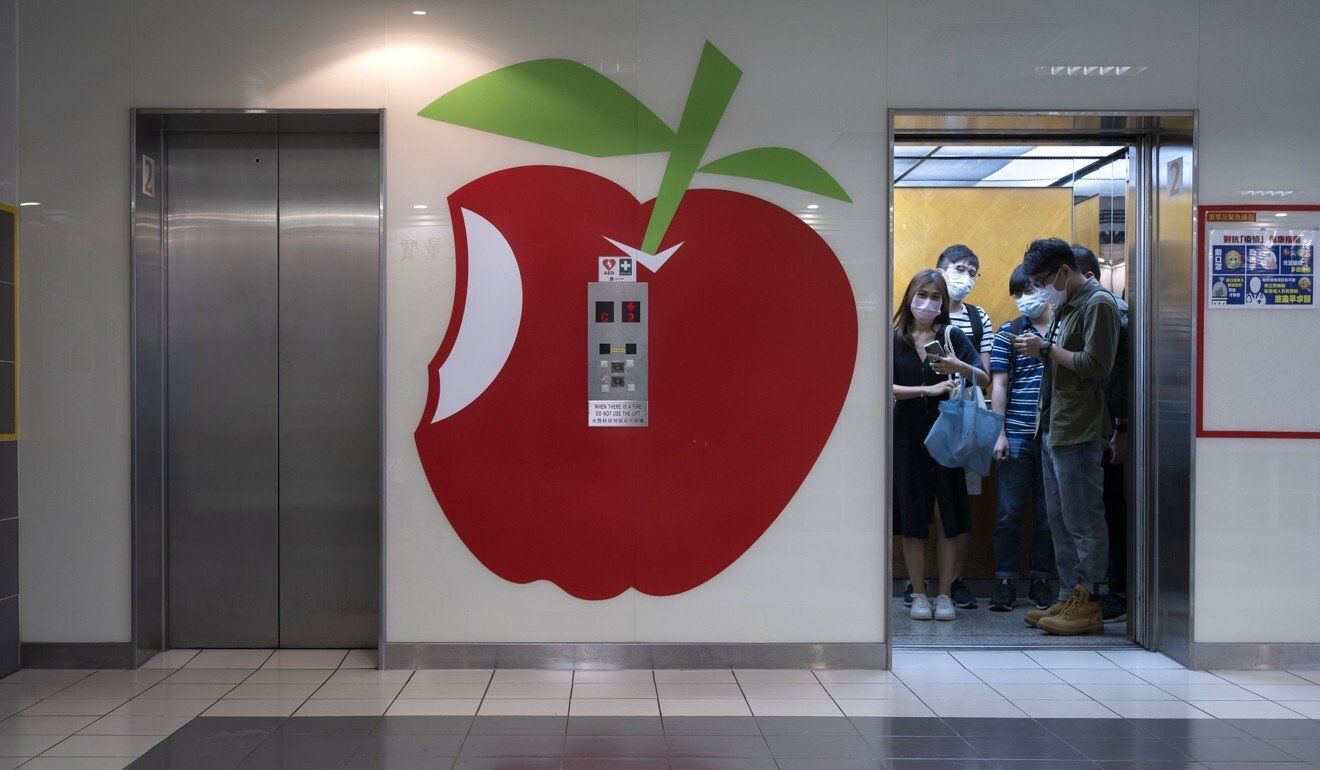 The 26-year-old Apple Daily closed in June after its assets were frozen
and several of its top executives and two writers were arrested under
the security law.
The 26-year-old Apple Daily closed in June after its assets were frozen
and several of its top executives and two writers were arrested under
the security law.
Hot on the heels of the paper’s closure, Stand News, an online news portal popular among the opposition camp, became the first media outlet to remove most of the commentaries from its site.
Citing safety reasons, online media Winandmac also said it had moved out of Hong Kong while another portal, Post 852, removed its commentary videos on YouTube.
RTHK, the city’s only public broadcaster, also underwent seismic changes after the government named veteran civil servant Patrick Li Pak-chuen, who had no media experience, as its new director in March.
Critical news programmes were withdrawn, veteran journalists were either fired or resigned, with the city leader Carrie Lam Cheng Yuet-ngor
being given airtime to promote Beijing’s controversial shake-up of the city’s electoral system in a new show.
Politics: opposition activists either behind bars or quit politics; Legco efficiency improved
A total of 47 activists and former lawmakers were charged under the national security law over their roles in what prosecutors described as a subversive plot to paralyse the government and topple the city’s leader by securing a controlling majority in the legislature through an unofficial primary election last July. Most of them were denied bail.
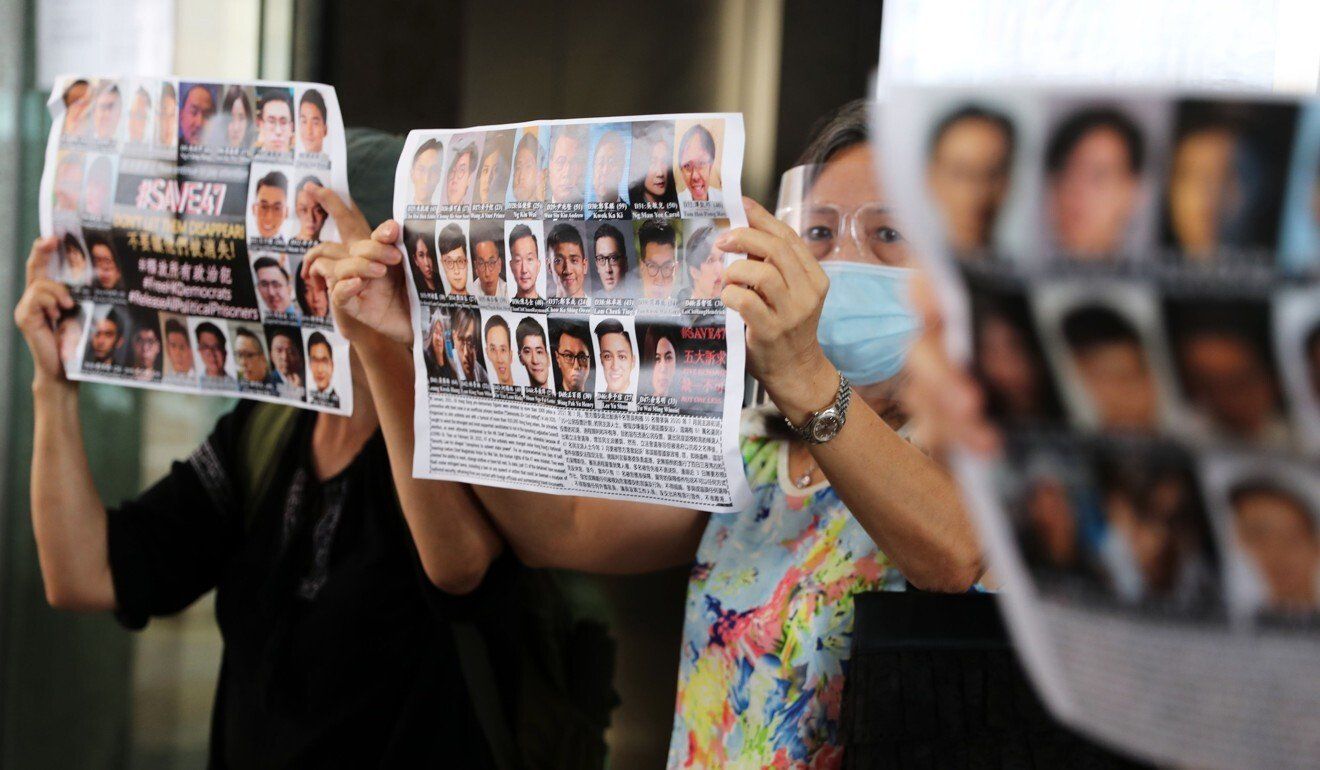 Supporters shout slogans outside West Kowloon Court during a hearing for
the 47 politicians and activists charged over an unofficial primary
last year.
Supporters shout slogans outside West Kowloon Court during a hearing for
the 47 politicians and activists charged over an unofficial primary
last year.
The clampdown prompted at least 30 prominent politicians to quit politics for good and several groups and parties – including the NeoDemocrats and Médecins Inspirés, a pro-democracy concern group formed by doctors – to disband.
Progressive Lawyers Group, which had been outspoken on legal issues, closed its website with most members refraining from commenting on matters relating to national security.
A growing number of activists also fled the city in the wake of the law, including Nathan Law Kwun-chung and Ted Hui Chi-fung. Many of them have since been placed on the wanted list for having violated the security law.
But the city government in May applauded the improved efficiency of the legislature, which used to be plagued by the opposition’s filibustering attempts.
Following the disqualification – and the subsequent mass resignation – of pro-democracy lawmakers, the government was pleased to see the passage of 16 bills and approval of HK$152.1 billion in funding requests this legislative year.
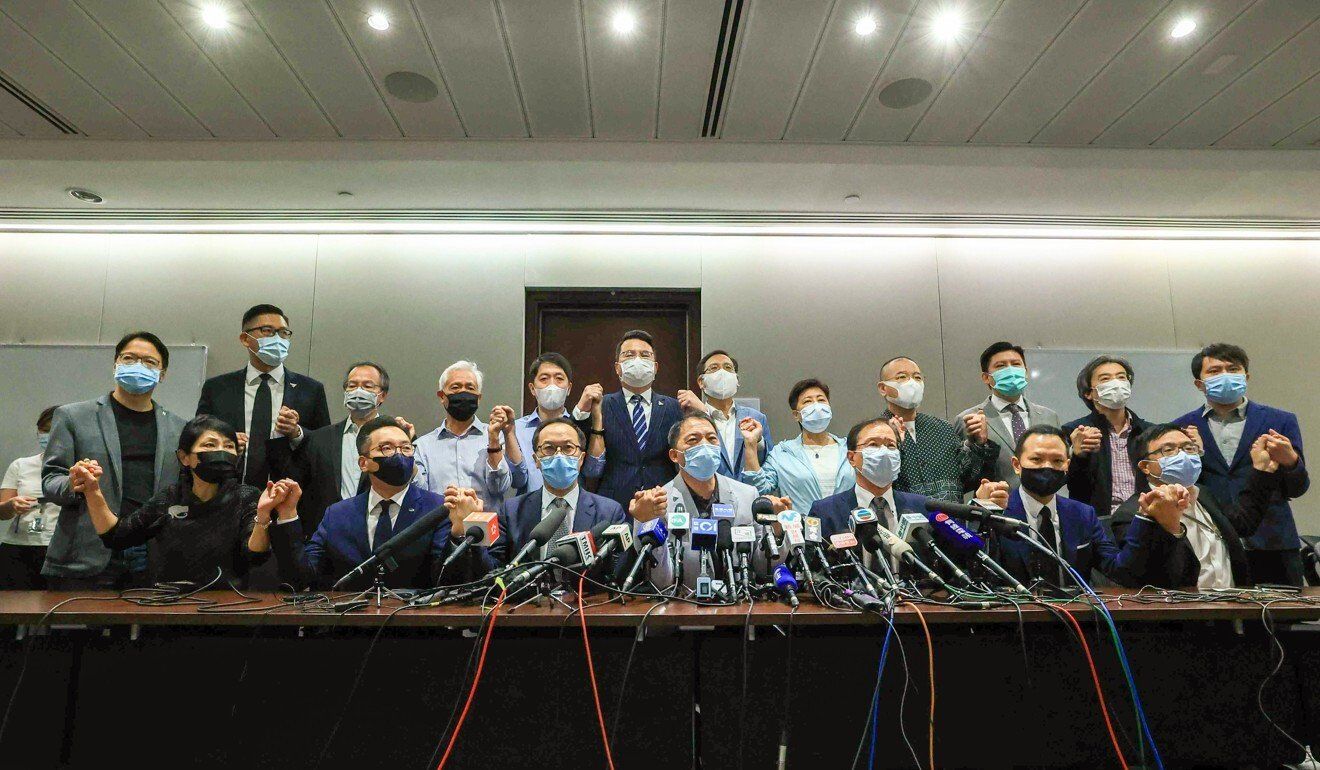 All of the Legislative Council’s pan-democratic members resigned en masse last year after four of their colleagues were ousted.
All of the Legislative Council’s pan-democratic members resigned en masse last year after four of their colleagues were ousted.
Elections: Beijing-imposed sweeping electoral changes; oath-taking requirement for civil servants and district councillors
Beijing announced in March it would overhaul the city’s electoral system to ensure only “patriots” could take up positions wielding political power.
The new electoral system slashed the number of directly elected seats in the Legislative Council from 35 to 20 and changed the composition to ensure the pro-Beijing camp would have guaranteed dominance in the chamber.
Opposition candidates also have to be approved by a powerful, pro-government vetting committee. While critics slammed the overhaul for muzzling the opposition, Chinese Premier Li Keqiang hailed it as key to improving the “one country, two systems” governing policy for Hong Kong after the mass protests in 2019.
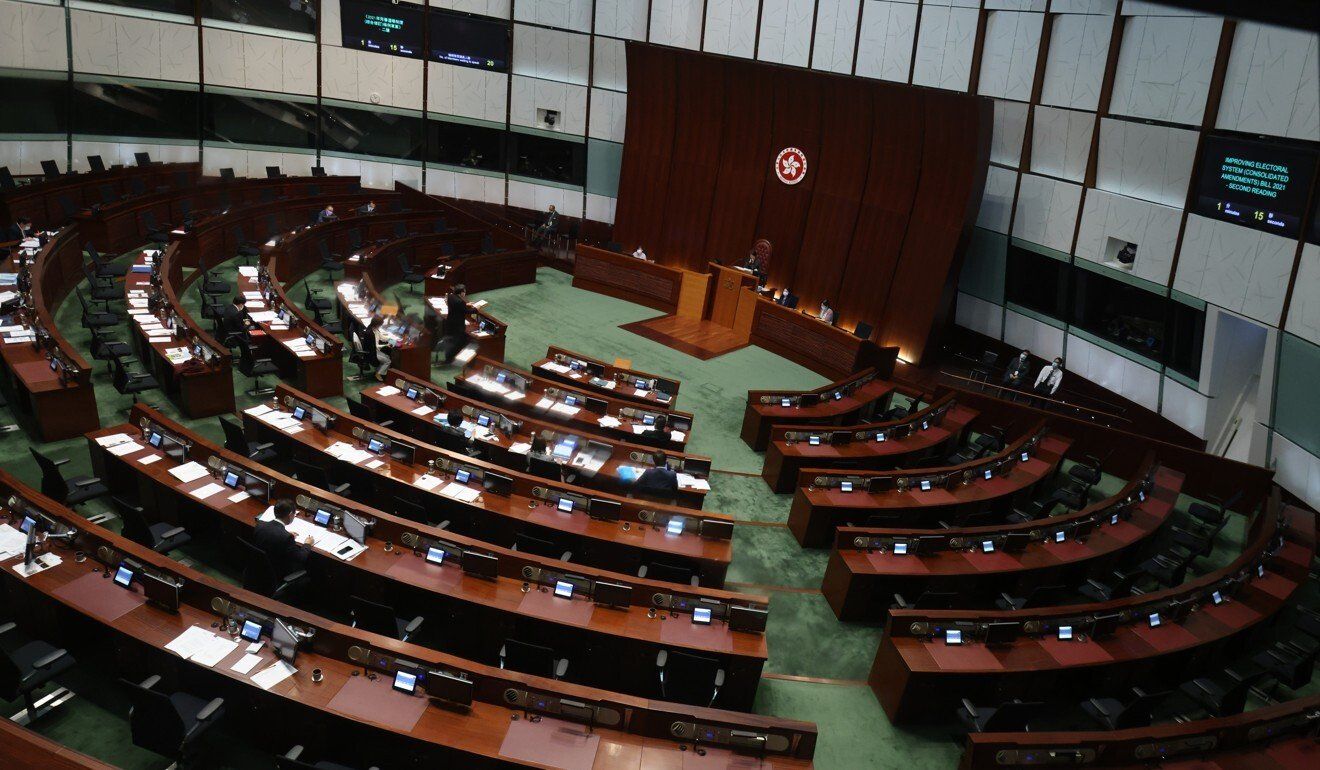 The city’s government has praised the Legislative Council as more
efficient since the departure of all its pan-democratic members.
The city’s government has praised the Legislative Council as more
efficient since the departure of all its pan-democratic members.
Under the requirements of the national security law, all 180,000 civil servants were also required to pledge allegiance to Hong Kong and the Basic Law, the city’s mini-constitution. About 130 staff who refused to sign were facing dismissal.
For district councillors, who are also expected to take an oath in July, sources said at least 150 of them from the opposition bloc could be unseated over their roles in the unofficial primary election.
Separately, Hong Kong’s law and order chiefs were promoted in late June, with Secretary for Security John Lee Ka-chiu elevated to be the city’s No 2 official while Commissioner of Police Chris Tang Ping-keung took over his minister position. Analysts said the reshuffle signalled Beijing’s insistence on national security topping the city’s agenda.
Courts: more stringent bail conditions; judges assigned by city leader
Hong Kong courts will be handling a series of prosecutions in the coming months involving the national security law and will have their work cut out in interpreting the new legislation while bearing in mind common law principles.
While foreign judges are still allowed to sit on the bench, judges dealing with national security cases have to be directly designated by the city leader.
Only 12 out of the 61 people charged so far had been granted bail due to the stringent threshold requirement set out in the national security law. The law specified bail would only be granted if a judge “had sufficient grounds for believing” the defendant would not continue to commit “acts endangering national security”.
That is different from the standard practice of approving bail except in certain circumstances, such as when a defendant is deemed a flight risk.
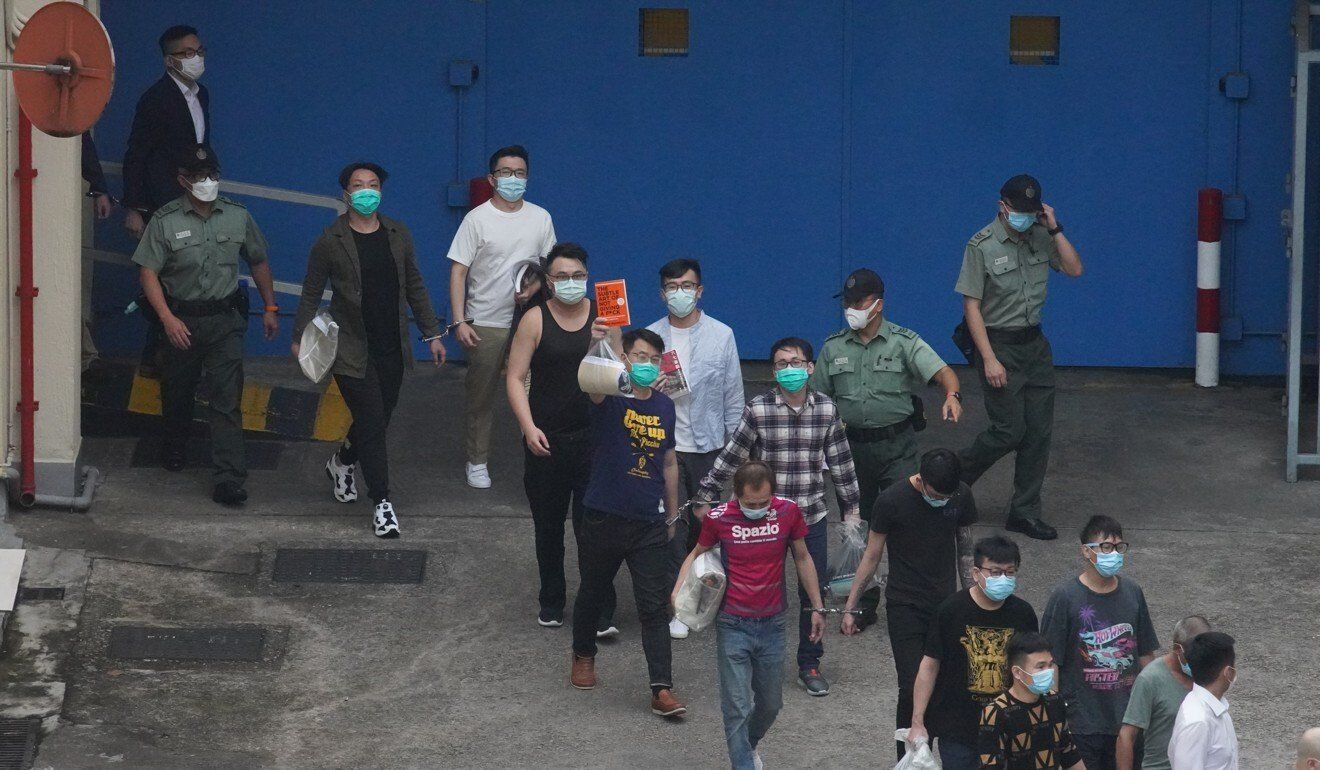 The national security law’s threshold for bail is more stringent than that of other offences.
The national security law’s threshold for bail is more stringent than that of other offences.
Citing undisclosed reasons relating to the national security law, last September, Justice James Spigelman from Australia became the first foreign judge to resign from the Court of Final Appeal. In June, a former top British judge, Baroness Brenda Hale, also said she would quit the city’s top court when her first term expired next month.
But Lord Jonathan Sumption, one of the nine British judges on the bench, asserted that calls for the withdrawal of foreign judges were merely part of a “political boycott” and made clear he intended to continue serving the Court of Final Appeal.
The deputy president of Britain’s Supreme Court, Lord Patrick Hodge, was named to replace Spigelman. But his appointment ignited debate in Britain, with senior ministers warning that judges should not lend “a veneer of legitimacy” to Hong Kong’s legal system if it was compromised by the security law.
Amid attacks on the judiciary, former chief justice Geoffrey Ma Tao-li argued that foreign judges should continue to sit on the bench and help enforce the Basic Law, which he described as the basis of judicial independence.
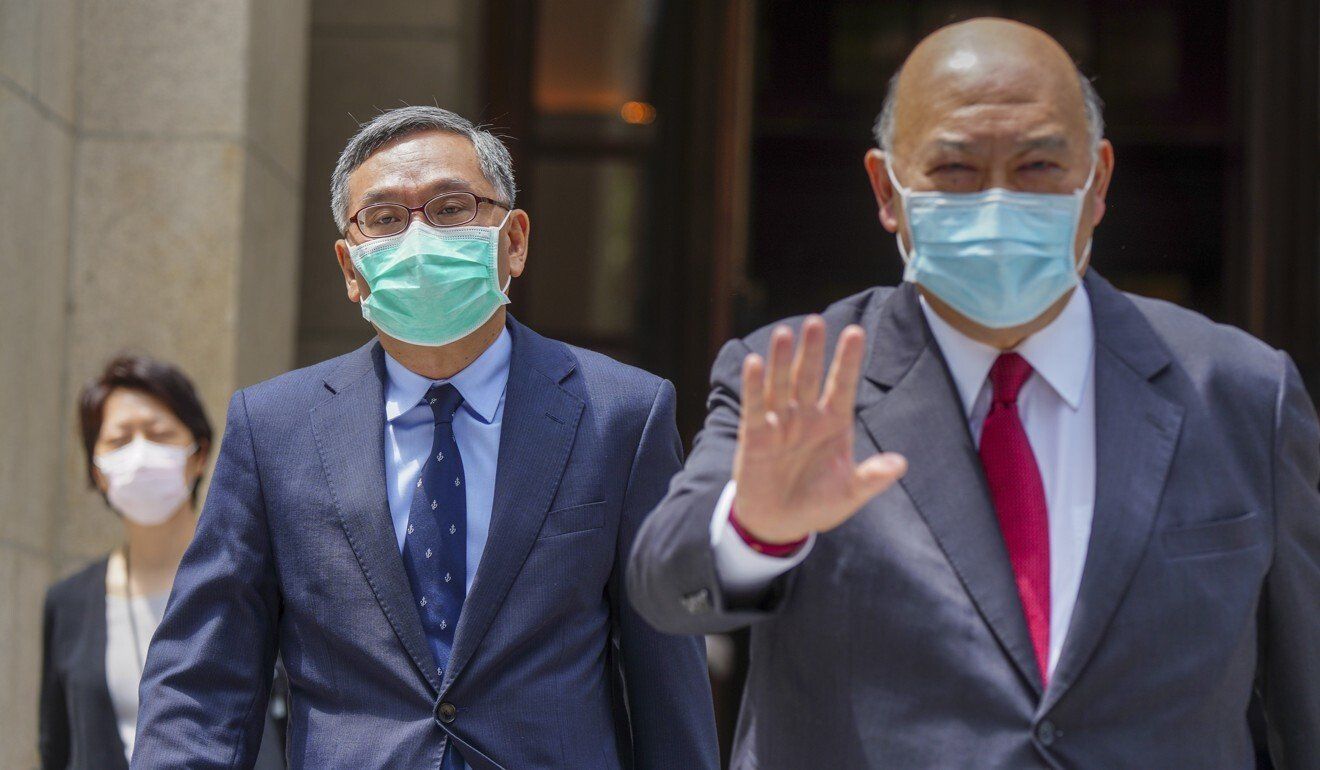 Former chief justice Geoffrey Ma (right) and his successor, Andrew Cheung, meet the press.
Former chief justice Geoffrey Ma (right) and his successor, Andrew Cheung, meet the press.
Chief Justice Andrew Cheung Kui-nung stressed that judges served “without fear or favour, self-interest or deceit”, and said repeated and gratuitous questioning of the judiciary’s independence based on disagreement with court decisions was demeaning to the rule of law.
International community: foreign sanctions and suspension of extradition treaties
The United States imposed at least four rounds of sanctions on Hong Kong and mainland Chinese officials over their alleged role in implementing the national security law.
In July, then US president Donald Trump imposed an executive order terminating the special treatment the city enjoyed under the Hong Kong Policy Act of 1992.
Eleven officials, including city leader Lam, were sanctioned with their overseas bank accounts closed, bank-issued credit cards cancelled and insurance coverage put on hold.
At least nine countries, including the US, Britain, France and Australia, suspended their extradition agreements and pacts with Hong Kong in light of the security law.
Among countries that condemned Beijing’s increasing control over Hong Kong, Britain, Canada and Australia also responded by opening a new pathway to immigration for Hong Kong people.
Protests: political groups at risk of being outlawed
Police, for the second year in a row, banned the annual candlelight vigil commemorating the 1989 Tiananmen Square crackdown in Victoria Park on June 4, citing public health grounds.
Pro-establishment politicians mounted a campaign to have the vigil organiser, the Hong Kong Alliance in Support of Patriotic Democratic Movements of China, outlawed, suggesting that one of the group’s calls – ending one-party dictatorship – was “subversive” under the security law.
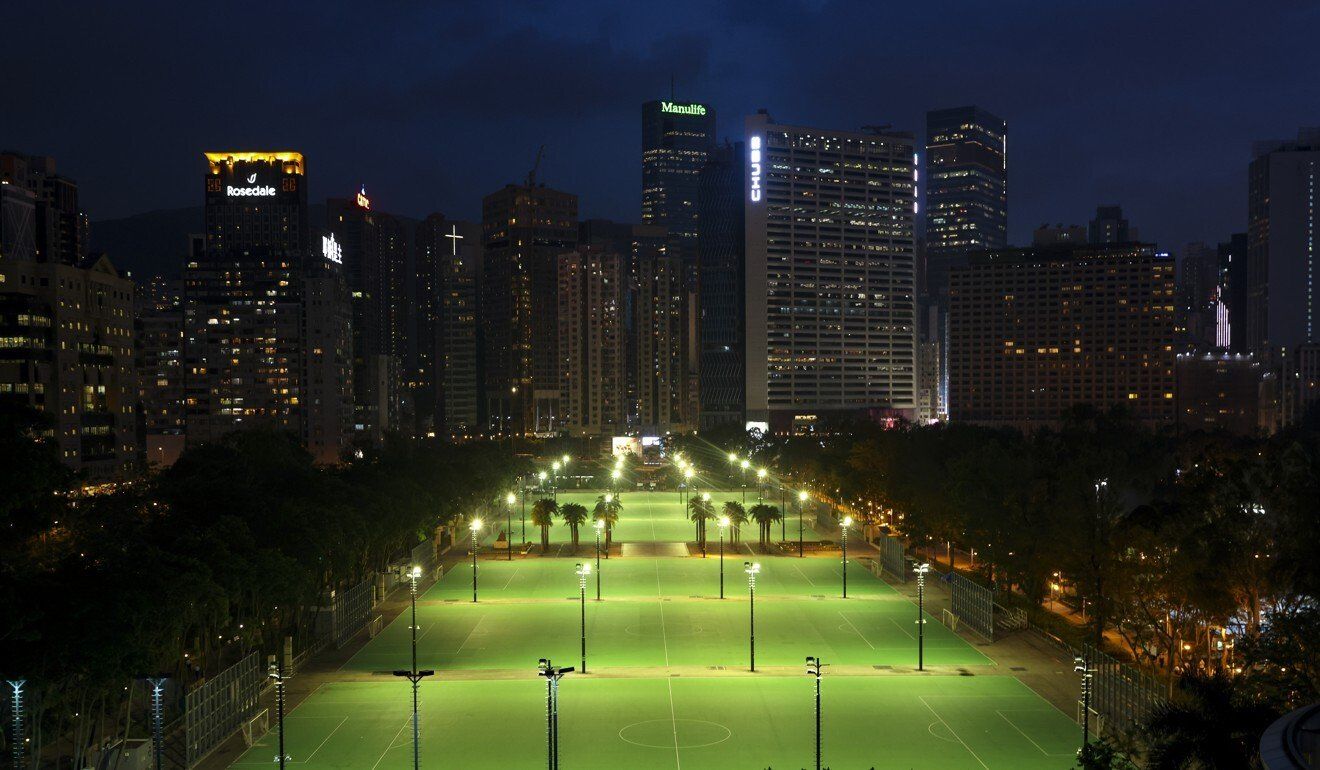 The football pitches in Victoria Park were empty on June 4 this year
after the annual Tiananmen Square vigil was banned for the second year
in a row.
The football pitches in Victoria Park were empty on June 4 this year
after the annual Tiananmen Square vigil was banned for the second year
in a row.
In April, the Civil Human Rights Front, an umbrella group best known for organising several massive protests during the 2019 social unrest in Hong Kong, faced a police investigation into the legality of its operations. Several parties and groups have withdrawn from the platform out of safety concerns.
Police also created a new purple flag warning members of the public they were potentially violating the national security law in public gatherings.
On July 1 last year, at least 10 people became the first to be arrested by police under the legislation, with some of them carrying materials with slogans deemed by the authorities to be separatist in nature.
Large-scale protests, however, did not materialise often in the past year, mostly due to the pandemic and social-distancing measures.
Schools and arts sector: new guidelines and removal of books
Education authorities issued guidelines to bring public schools in line with the new law, covering every aspect of schooling, from management and teaching, to pupils’ behaviour even off campus, in a tough campaign to wipe out protests and instil patriotism.
Publishers revised the content of textbooks. Public libraries also reviewed their book collections and removed certain titles, such as ones written by Jimmy Lai, even though some of them only touched on food and restaurants.
While academia has been taking a wait-and-see approach while learning to navigate the new environment without compromising intellectual freedoms, some scholars stopped writing opinion columns and others felt some areas of research to be too risky, raising fears of self-censorship.
But Arthur Li Kwok-cheung, chairman of the University of Hong Kong’s council, said so far he had not heard of any research that had met with disapproval by his institution, and maintained that the freedom to criticise the government regarding bad policies still existed.
On the cultural front, Hong Kong filmmakers have to toe a new line under the security law, with official censors now authorised to ban movies that breach the legislation under amended guidelines gazetted in June.
A local cinema was pressured by pro-Beijing media into scrapping the screening of a documentary on the fierce clashes during the 2019 social unrest, while the M+ Museum in the city’s cultural hub came under similar pressure not to show exhibits deemed to be anti-China art.
Businesses: wait-and-watch but money is pouring in
The national security law prompted a few businesses to pull out of the financial hub, including global investment giant Vanguard which decided to terminate its ETF business in the city and shift its strategy to the mainland.
But the stock market remained hot and robust. The combined value of Hong Kong-Shenzhen and Hong Kong-Shanghai trading hit an annual peak of about 150 billion yuan (US$23.2 billion) last July, the month after the national security law took effect.
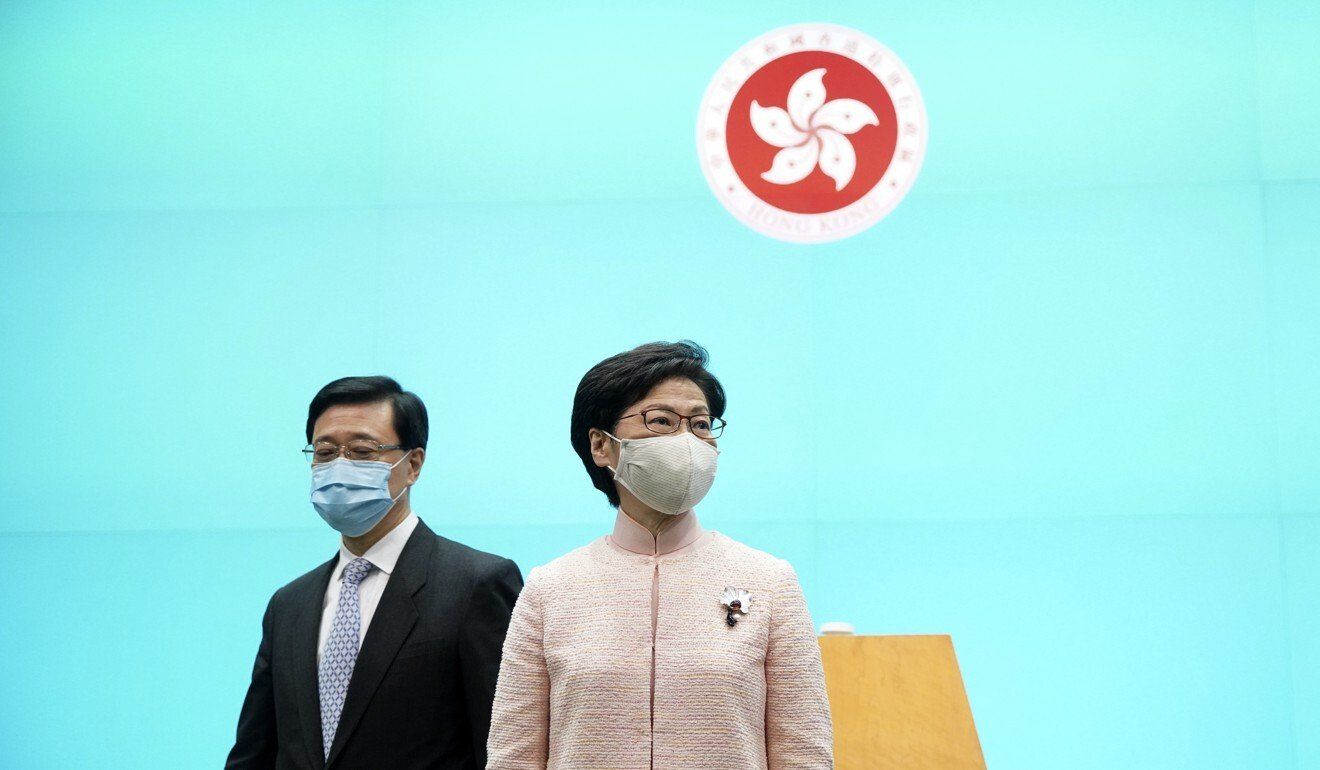 Carrie Lam (right) says there has been no significant outflow of capital.
Carrie Lam (right) says there has been no significant outflow of capital.
Lam said in May there was no significant outflow of capital, adding that there were 9,000 mainland and overseas companies based in the city.
Hong Kong retained its global top-three ranking in terms of initial public offering funds, with Chinese biotechnology and health care companies accounting for more new listings than any other sector in the first six months of 2021.
A survey by the American Chamber of Commerce found that 40 per cent of its members were considering leaving the city, with most citing discomfort with the security law as one reason. Its chairwoman Jessica Bartlett said she did not anticipate a mass exodus of US capital from Hong Kong.
Society: school withdrawals and a possible wave of migration
Visa applications and the withdrawal of children from local schools suggested that at least tens of thousands of Hongkongers left the city with relaxed migration policies introduced by Western countries.
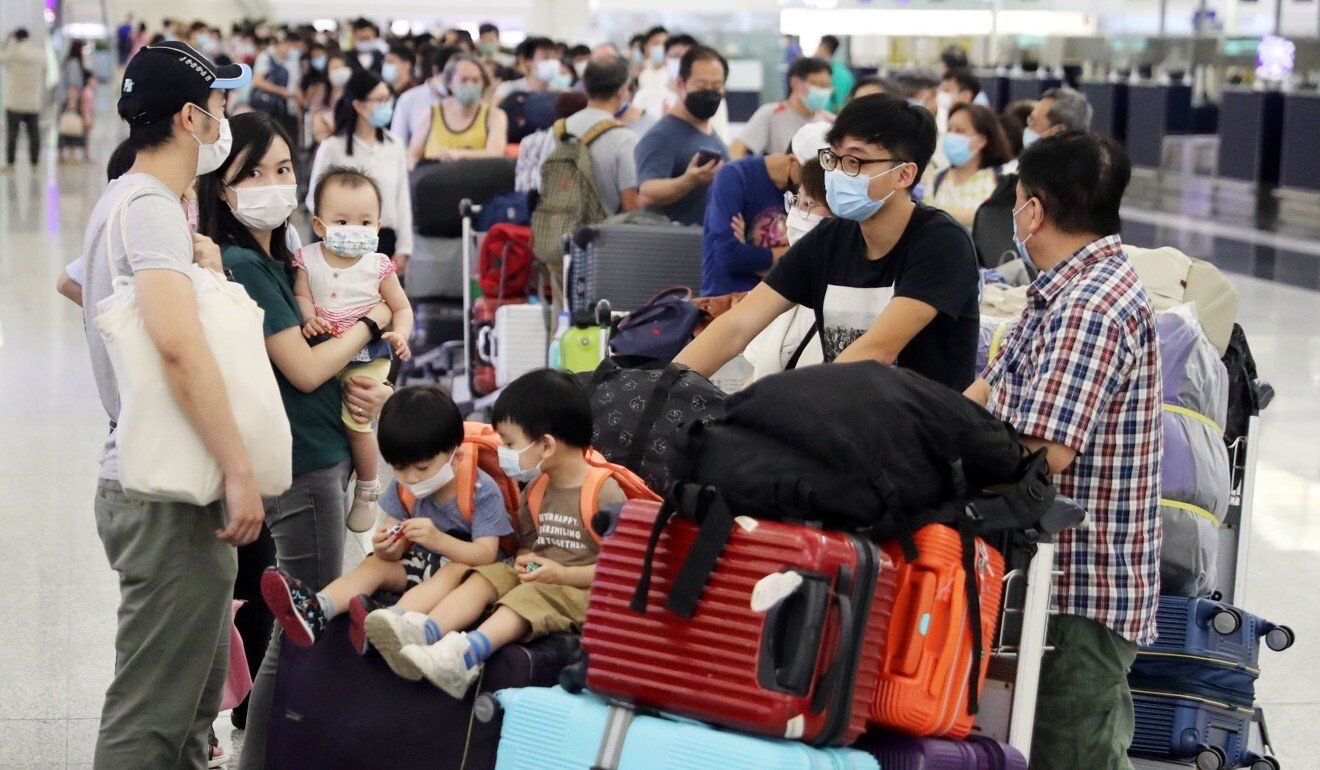 Thousands of Hongkongers appear to be leaving the city.
Thousands of Hongkongers appear to be leaving the city.
Britain estimated that as many as 322,000 Hong Kong residents, out of the city’s population of 7.5 million, with British National (Overseas)
status would move there from now to 2025.
Canada said that its new immigration pathway for Hongkongers drew 5,727 applications in the three months after its February launch.
About 19,300 pupils – around 3 per cent of the student population – dropped out from primary and secondary schools in 2020-21, nearly double the 10,400 who did so the previous year, according to Education Bureau statistics.











